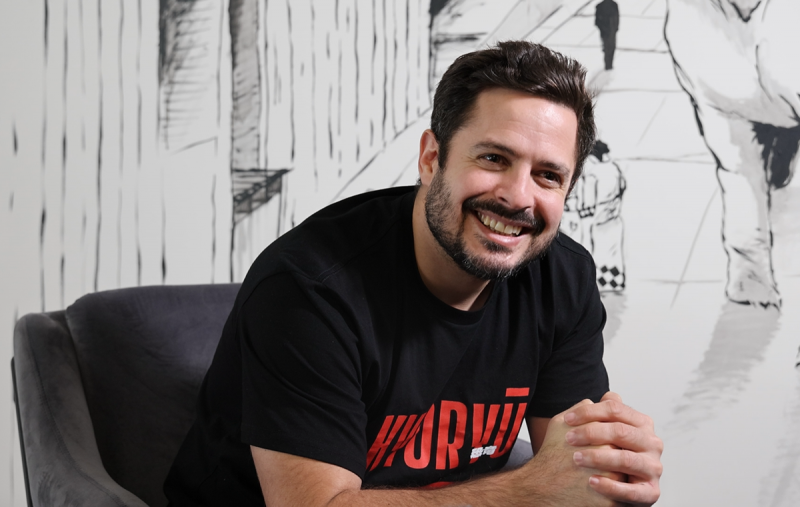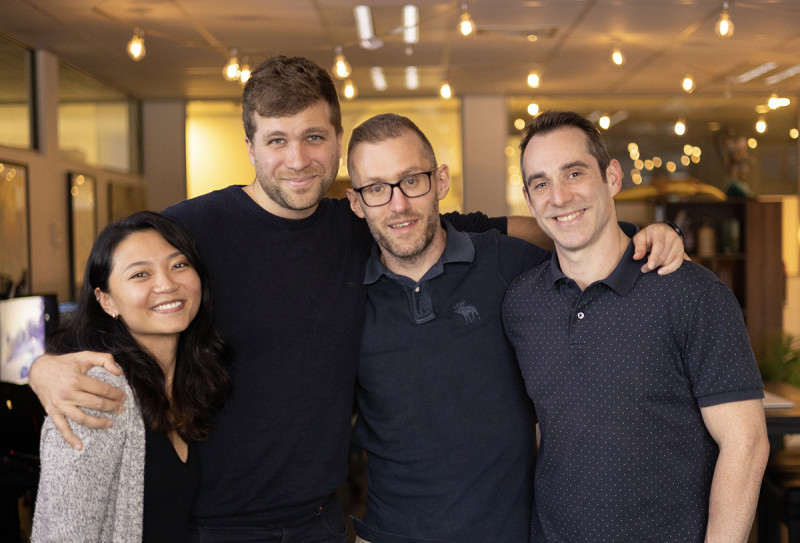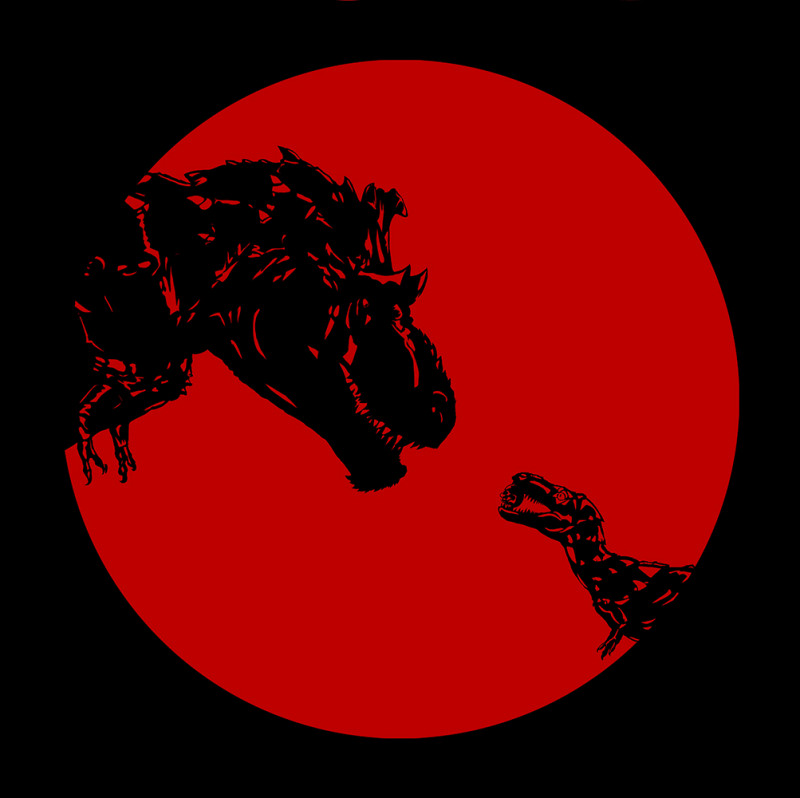
Benjamin Mulot

Stephanie Parker, Garrick Rawlingson, Lukas Niklaus, and Laurent Herveic

Wellington Silver Screeners: Lukas Niklaus and Benjamin Mulot of Floating Rock by Alessia Belsito-Riera
In our Wellington Silver Screeners series, Alessia Belsito-Riera shines a spotlight on the movers and shakers working in the film capital of New Zealand.
Both Lukas Niklaus and Benjamin Mulot of Floating Rock can distinctly remember the moment their passion for animation was ignited. For senior animator Benji it was when he first saw Jurassic Park. For co-founder and CEO Lukas, it was during his first apprenticeship, but years down the road his mum showed him a Post-it note flipbook he made as a kid.
“I think we are all like that,” Benji says. “When you work in animation and movies everybody started very young. We know what we want to do, and we’re not gonna derail from it.”
Now two of the driving forces behind one of Wellington’s up-and-coming animation companies, the pair are currently working on the series and game Kyōryū. Born from Benji’s own love of dinosaurs, this heartwarming and endearing story is set in post-apocalyptic Japan in a world dominated by genetically re-engineered dinosaurs.
Within 10 days of its release, the trailer went viral, garnering one million organic views. It also caught the attention of Oscar and Emmy Award-winner Mark Andrews (Brave, Samurai Jack). Read on to learn what all the hype is about.
What made you two want to work in film animation?
Lukas: I did an apprenticeship as a typographer/graphic designer, and I started working at a company that asked me to learn this 3D software called Cinema 4D for digital visualisations. A whole new world opened itself up to me and from there I needed no one to motivate me – I read everything, learned everything on my own, I did courses, and I eventually stumbled upon Animation Mentor, which showed me the actual discipline of animation and the spectrum of jobs that you can do. I was hooked seeing these blocky little characters with just two black dots as eyeballs and no mouth come to life. That’s the core of what makes animation so beautiful: you bring something to life, and if you do it right, you get whoever watches it to feel something. I still love that. I love that about everything I’ve worked on. What hooked me is the storytelling.
Benjamin: It was the early 90s, and I was watching special effects shows on TV. When I watched Jurassic Park, I was like, ‘This is crazy cool’. I decided I was gonna make my own movie. I think I was12 years old when I took my dad’s camera and started filming with my Jurassic Park toys. After that I never stopped, and I started to learn the world of animation when the industry was shifting from practical to CGI. We started realising we could do crazy stuff with computers, so I switched to computer animation, and I think I made the right choice!
How did you get your start in the industry?
L: I did Animation Mentor, which is an online course for 18 months, and I knew that I had to leave Switzerland to get work. I attended the graduation in San Francisco the week before SIGGRAPH was being held in LA. I can remember so distinctly that at the SIGGRAPH job fair everyone was lining up at all the big companies, and the lines were freaking huge. The line at the Pixomondo booth was like five people, so I was like, ‘I’m going there’. Luckily, Pixomondo is a German company, so I got to talk to the recruiter in German, which was an instant connection. They had just opened up in Toronto and I was offered a position there. I just worked day and night. I worked at work, got home and worked on my own stuff, weekends worked on my own stuff. For two years I didn’t do anything else.
B: That’s so cute! My first job was in Paris, where I was doing art school. I was learning animated by myself at home, same as Lukas. I would close the door of my bedroom and just do animation, your heart is just like, ‘This is gonna be my life’. I managed to get a little show reel. Back then you were like fresh meat for a VFX company – super easy to train and form, you cost absolutely nothing. I started work on an animation movie called Arthur and the Invisibles. To find a job it’s never you applying online, it’s always someone that knows someone. This is where I met my mentor, Ludovic, who helped me find jobs. It’s really not how your CV is written or the school you went to, it’s about your contacts. After that I worked with them for 15 years.
Lukas, can you tell me about how Floating Rock came to be?
L: It started in 2019 when Garrick [Rawlingson] and I were working at Animal Logic over in Sydney. Garrick and I were bouncing our idea around for when we came back to Wellington. We talked about names, we talked about logos and what we could do. When we came back, Stephanie [Parker] got on board as well. COVID was just about to lock everything down in January 2020. We made the decision to get incorporated and then we emailed the whole world, literally. We got our first job and just like that we started to grow. At some point Laurent [Herveic] joined as well. One thing that I always say in sales calls is with success comes ambition. As we got more successful, we got more ambitious, and we wanted to do more stuff. We had no idea what we were doing. And now look where we are. It’s amazing to see where we started.
How did you become a part of it, Benji?
B: I was on the beach, and I found this lamp in the sand – I rubbed it and like four genies came out! I was like, ‘Hey, guys! You wanna make dinosaurs?’ [Laughs.] And my wish came true!
We all knew each other from work. I was working on my own animation when they were building the company and at some point they contacted me saying they were working on a music video and had to animate a cockroach. The first office was just a little room the size of a bedroom. We had so much fun working every day, doing small projects, it was like family. It’s just so cool to work with your friends.
What is Kyōryū about?
B: I grew up loving dinosaurs. Pure nerd. I remember one day I buried a roast chicken skeleton in the garden and pretended to find it. My dad was like, ‘My kid likes dinosaurs’, so he brought me to museums and palaeontologist sites. The story is inspired by me and my dad but they’re dinosaurs. There’s the big dad, Yama, and a young T-Rex, Tori, who is interested in humans, because in the world of Kyōryū, humans have completely disappeared – they live in a post-apocalyptic world. It’s like reverse palaeontology. Tori is so into humans while Yama just wants to help and protect him because he loves his son – the same way my dad was more into books and stuff but knew I loved dinosaurs. We reversed the story, it’s pretty cute.
L: About two and a half years ago, we raised some venture capital money to develop our own IP and empower other people to develop their own ideas. Benji took it very literally. When he presented [his idea] to us, we were like, ‘This is perfect for a proof of concept, to build our pipeline, and to show the world what we can do’.
Will the game and the series share the same storyline?
L: They will be part of the same world. From what we’re conceptualising, the story of the game is a bit earlier and the story of the series a bit later, and there’s a middle part where they overlap. You’re going to experience some parts of the story from Yama’s point of view and then in the game you’re going to experience that same moment but from Tori’s point of view. You’re also going to encounter similar characters. That’s why we want to make it at the same time so it’s cohesive. We’re calling this cineplay. There’s a list of games being made into movies but it’s always an afterthought. We’re creating them together.
How would you describe working in Wellington’s industry?
L: It’s an amazing community here. I think it deserves a much bigger place in the world ranking of visual effects cities because the amount of talent here is insane. The country, the government, the institutions, everyone is rooting for us and trying to help us. There was so much knowledge that we needed to acquire about how to get funding and who we needed to talk to. We felt well supported. The creative community is amazing in Wellington, I think it’s a good place to start a company like this. New Zealand as a whole is on the rise internationally when it comes to the digital industry.
What advice would you give somebody wanting to get into animation?
B: If you want to learn animation don’t be scared to spend a lot of time learning by yourself. I think the big advantage is you don’t need degrees for this industry, you just need to work and improve your skills. You need money for a computer and internet and, it’s crazy, but that’s pretty much it. I think the best way to learn new skills is to choose what will motivate you the most. When I learned piano, I started with reading notes; I thought it was so boring that it made me stop. Then I had another teacher that taught me jazz and blues, which I thought was so much more fun, so I started learning to read notes. This is the same for animation; you can come back to the academic and more boring stuff, learn by doing things that you love.
View more articles from:
« Issue 232, November 5, 2024

